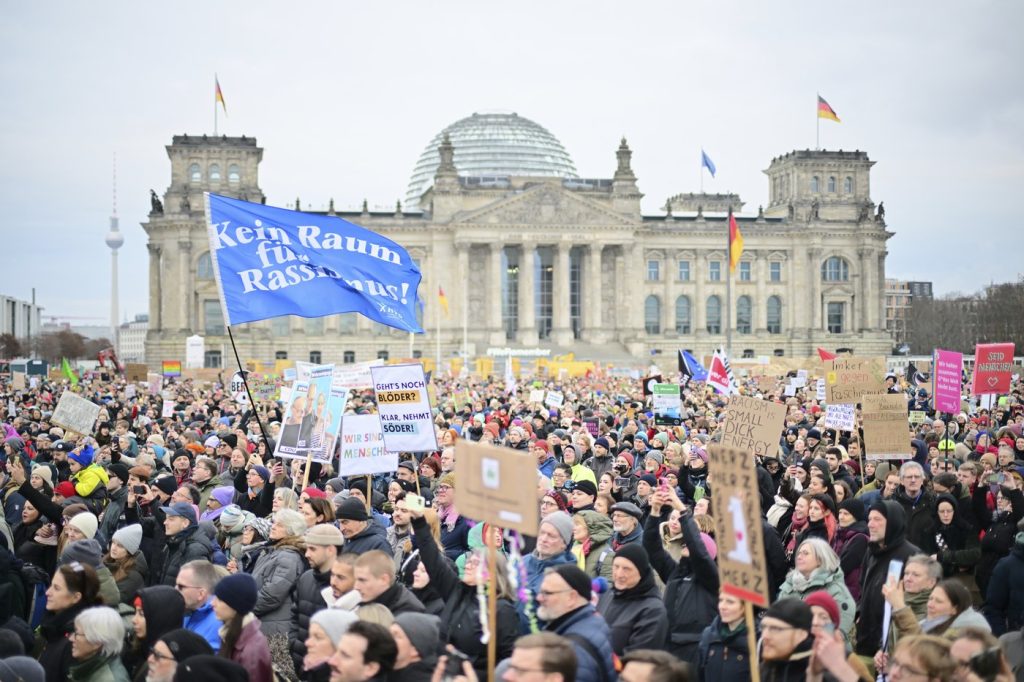BERLIN (AP) – Over the weekend, tens of thousands of people demonstrated across various cities in Germany, including Hamburg, Munich, Cologne, and Leipzig. The protests were primarily against Friedrich Merz, the center-right leader and front-runner in the upcoming Feb. 25 election. The trigger for the protests was Merz's recent proposals for stringent new migration rules, which have drawn not only significant public criticism but also support from the far-right Alternative for Germany (AfD) party.
Protesters expressed their anger, arguing that Merz and his Christian Democratic Union (CDU) have violated Germany’s unwritten post-Nazi commitment among democratic parties to refrain from collaborating with far-right nationalist groups like the AfD. This sentiment was particularly clear during the demonstrations, with many protesters holding signs condemning racism and advocating for democracy and diversity. The protests culminated in a significant rally in Berlin, where estimates suggest up to 20,000 people participated.
On Wednesday, Merz proposed a nonbinding motion in parliament advocating for the increased ability to turn away migrants at Germany's borders. This measure barely passed with the support of the AfD. Merz's intention was to reinforce his center-right Union bloc’s stance on curbing irregular migration, especially in light of a recent knife attack attributed to a rejected asylum-seeker. However, this move has sparked a broader controversy regarding the implications of aligning with a far-right party.
On Friday, the German parliament voted narrowly against a bill designed to impose tougher migration regulations, marking a notable moment as it would have been the first proposed legislation to advance with far-right backing. Critics, particularly from the left, accused Merz of breaching a long-held political taboo that serves as a firewall against far-right influence, insisting that this kind of collaboration threatens the integrity of mainstream political discourse in Germany.
Despite the backlash, Merz maintains that his position remains unchanged, asserting that he is not engaging in a partnership with the AfD. Nevertheless, the events have raised questions about the viability of the political strategy pursued by the Union, which is reportedly leading in current polls with around 30% support, while the AfD trails with approximately 20%. Meanwhile, the Social Democrats and the Greens are positioned further behind in voter support.
Merz seems to be banking on this hardline stance on migration to appeal to voters, attempting to position the Union as a decisive force in addressing migration issues. His goal appears to be to eclipse the AfD's anti-immigration rhetoric while simultaneously portraying the governing parties, which argue they have been proactive on migration, as disconnected from popular opinion.
The AfD, founded 12 years ago, first made significant inroads into the national parliament in 2017, largely benefiting from the decision made by then-Chancellor Angela Merkel to accept large numbers of migrants into Germany two years prior. This recent wave of protests echoes a similar grassroots movement witnessed a year ago, when hundreds of thousands opposed the ascension of far-right ideologies and the suggested deportation of individuals, some of whom held German citizenship.
The broad public response against the CDU's migration policies and the fear of far-right normalization highlights the ongoing tensions and challenges faced by German society as it grapples with issues surrounding immigration, identity, and political collaboration.










